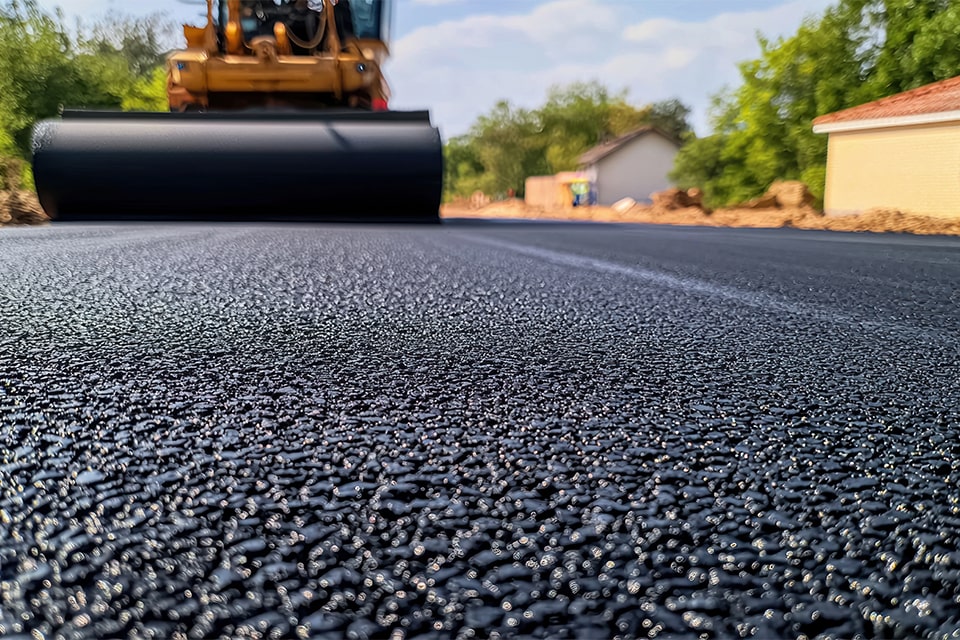For many homeowners in New York, a driveway is more than just a place to park their cars; it’s a significant part of their property’s curb appeal and overall value. However, the harsh realities of changing seasons, from scorching summer sun to freezing winter snow, can take a toll on asphalt driveways. This often leads to the question: Is seal coating really worth it? The answer is a resounding yes. Seal coating is a crucial preventative maintenance step that can significantly extend the life of your driveway.
How Does Seal Coating Protect Your Driveway?
Asphalt pavement is a mixture of sand, gravel, and a petroleum-based binder. Over time, this binder is susceptible to degradation from various elements. Seal coating acts as a protective barrier, shielding your driveway from the factors that cause it to break down.
One of the primary culprits of asphalt deterioration is oxidation from the sun’s ultraviolet (UV) rays.
This exposure causes the asphalt to become brittle, leading to cracks and crumbling. A quality seal coat acts like sunscreen for your driveway, blocking these harmful UV rays and preserving the flexibility of the asphalt.
Water penetration is another significant threat. Rain, snow, and ice can seep into small cracks in the pavement. In the winter, this water freezes and expands, turning minor cracks into major problems.
Seal coating fills these small voids and creates a waterproof membrane, preventing water from infiltrating and eroding the sub-base of your driveway.
Furthermore, seal coating provides a barrier against chemical spills such as oil and gasoline, which can soften and dissolve the asphalt binder.
By sealing the surface, these substances are prevented from penetrating and causing damage.
What Are the Benefits of Seal Coating Your Driveway?
Beyond the science, the practical benefits of regular seal coating are clear. A properly maintained and sealed driveway can last significantly longer than an unsealed one. While an unsealed asphalt driveway might last around 12 years, regular maintenance, including sealing every 2 to 3 years, can extend its lifespan to about 20 years.
Here’s a breakdown of the key advantages:
- Increased Longevity: As mentioned, seal coating can nearly double the life of your asphalt driveway.
- Prevents Cracks and Potholes: By filling surface cracks and preventing water and other elements from penetrating, seal coating helps to stop larger cracks and potholes from forming.
- Enhanced Appearance: A fresh coat of sealant restores the dark, rich black color of new asphalt, instantly boosting your home’s curb appeal. It also provides a smooth surface that is easier to clean.
- Cost-Effective Maintenance: The cost of regular seal coating is a fraction of the price of extensive repairs or a complete driveway replacement. Addressing minor issues with timely sealing can save you thousands of dollars in the long run.
- Faster Snow and Ice Melt: The dark color of a newly sealed driveway absorbs more heat from the sun, which can help snow and ice melt faster in the winter.
How Often Should You Seal Your Driveway?
For optimal protection, it’s generally recommended to seal your asphalt driveway every two to three years. However, the ideal frequency can depend on several factors, including the amount of traffic your driveway receives and the severity of the weather conditions in your area.
For new driveways, it’s advised to wait about 90 days for the asphalt to fully cure before the initial seal coating.
How Much Does It Cost to Seal a Driveway?
The cost of seal coating a driveway can vary based on the size of the driveway and the type of sealant used. On average, homeowners can expect to pay between $275 and $820 for professional seal coating, with the national average being around $545.
When you consider the high cost of repaving a driveway, this regular maintenance is a sound financial decision.
In conclusion, seal coating is not just a cosmetic touch-up; it’s a vital protective measure that significantly prolongs the life of your asphalt driveway.
By investing in regular seal coating, New York homeowners can protect their driveways from the elements, enhance their home’s curb appeal, and avoid costly repairs down the road.
Additional Reads:
The Pros and Cons of Sealing Asphalt
